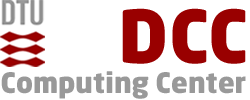HPC at DTU is both a facility where students and researchers can run their simulations, but also a laboratory where to develop new software taking advantage of all the possibility of modern High Performance Computing, and to experiment with different solutions. For this reason, an extensive set of software packages, development tools and libraries is available and constantly (tried to be) kept up to date.
The HPC staff takes care of the installation, the management, and the maintenance of the software, with an eye towards reliability and performance.
DCC, currently, maintains two disjoint software stacks. Their use is listed below. Common for all software stacks maintained is the use of module which enables having multiple versions of the same software available at any time.
To check what software is available do:
$> module availwhich will list all modules available to you. When you’ve found a piece of software you wish to use, say gcc/9.1.0 simply do:
$> module load gcc/9.1.0and gcc will be 9.1.0. The above applies to all our software stacks.
Software stack — 1
A new user (a fresh .bashrc) will use this software stack.
This software stack is constantly evolving and we strive to keep software up to date as released if users requests software.
Software stack — 2
This software stack is only enabled on the LSF queue.
By following DCC software stack you will disable the other software stacks and enable a consistent software stack which is versioned.
This software stack will update software less frequently but relies on reproduceability since one can always return to any software stack version.
